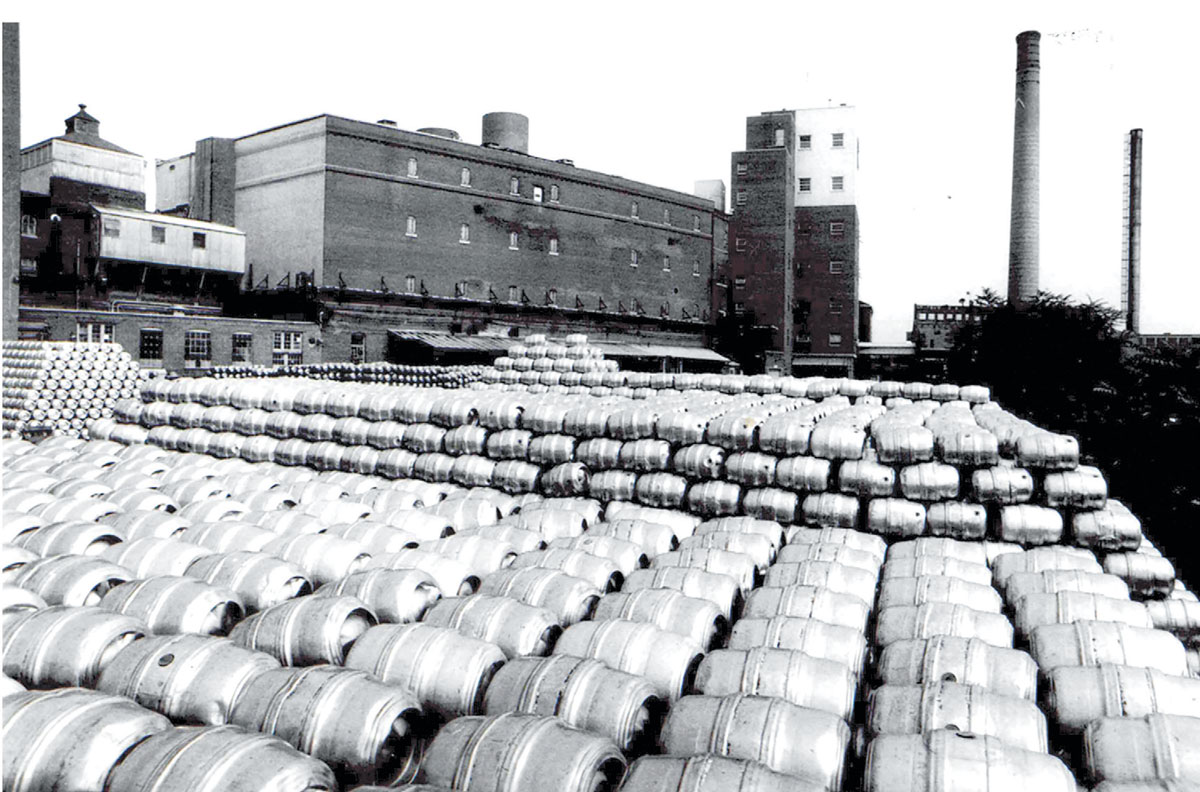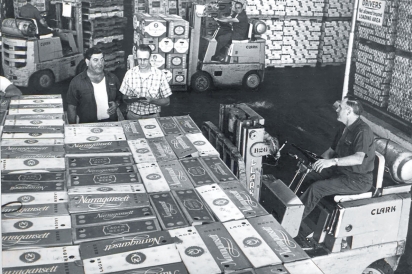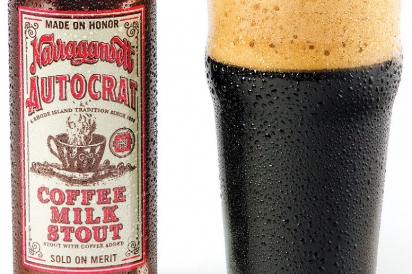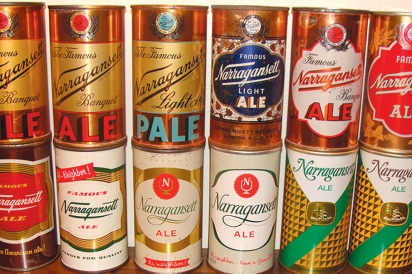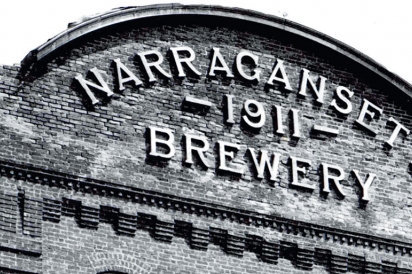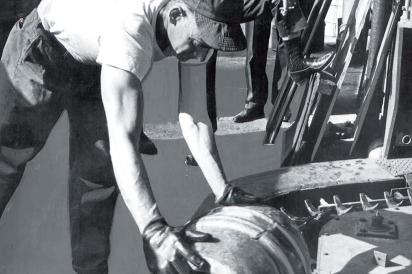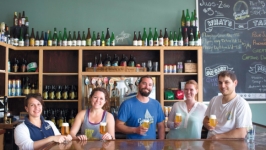Narragansett Beer
A Rhode Island Homecoming
Who doesn’t like a tallboy—16 ounces of cold, foamy beer? With its simple red label and proclamation of “made on merit, sold on honor,” an aluminum pint of good old ‘Gansett lager is a workhorse of a beer. A beer for after a long day at work, for a backyard barbecue, for a day out on the beach or a night out at a show, an anytime beer, the beer of New England—and the beer we almost lost.
Once upon a time, Narragansett was the number one beer in New England. Launched in 1890 in Cranston, by the early 20th century ‘Gansett commanded a majority of the market share, aided by a state-of-the-art brewery built between 1890 and 1914 that even included its own blacksmith shop and ice-making facility. Though the company had to weather the storm of Prohibition, as did the rest of the country, they pulled through by making “medicinal” brews, and by mid-century were back at the top of their game.
This happened in large part because of the leadership of then-President Rudolf Haffenreffer, a man whose family had their own Boston-based brewing dynasty, a dynasty he eventually brought under the Narragansett umbrella.
Perhaps you recognize the Haffenreffer name from 40-ounce bottles of Private Stock malt liquor, a Pabst product. Either way, Haffenreffer was a beer wizard, and rebuilt the brand beyond even its pre-Prohibition glory. At one point Haffenreffer even hired a young Theodor Geisel, the man you might better know by Dr. Seuss, to do some design work for the brewery. Probably not because of Dr. Seuss, at its peak in the mid-’60s Narragansett controlled almost 70% of the New England beer market. It was the official beer of the Red Sox, where announcer Curt Gowdy made popular the ad slogan, “Hi, neighbor, have a ‘Gansett.” The neighbors sure did have a ‘Gansett—in fact, they had more than a few. In 1972 the plant was pumping out 1.7 million barrels of beer annually for Narragansett, plus several other labels.
By this time the St. Louis—based Falstaff Brewing Company owned the brewery. Producing 1.7 million barrels of beer for the various regional labels owned by Falstaff, including Pickwick and Ballantine, ran the factory into the ground. The Cranston facility simply couldn’t keep up with demand, and it was easier to close than to modernize. In the early 1980s despite considerable intervention by the Rhode Island state government, the Narragansett brewery was shuttered and, years later, demolished to make way for a shopping center.
So that should be it, right? Just another American story of consolidation and destruction, a New England business outsourced and forgotten to time. Enter Mark Hellendrung. Hellendrung, a Rhody native, rose through the ranks of Nantucket Nectars to become that beverage company’s president. After leaving Nantucket Nectars, and after a brief stint at Burlington, Vermont—based Magic Hat Brewing Company, Hellendrung, along with a group of investors, bought the Narragansett brand from the Pabst Brewing Company in 2005. After more than 20 years ‘Gansett was coming home.
Asked about buying the brand, Hellendrung explained that at that moment he had a choice to make: He could bring everything back, rebuild the brewery and hope the brand took off. Or, he could bring back the brand and use this as a springboard to bring back the brewery. In the end, Narragansett went with the latter. Hellendrung contracted with Genesee out of Rochester, New York, to produce Narragansett beer.
It wasn’t enough to simply have Genesee in a Narragansett wrapper. As Hellendrung explained, this is a beer with heritage, the beer that your father and grandfather drank; it had to come back in earnest. So the company tracked down Bill Anderson. Anderson was the last brewmaster of ‘Gansett, back in the ‘60s and ‘70s. It was his charge to bring back the taste of the forgotten beer, and so he did.
Hellendrung didn’t stop there, though. The whole brand is a reclaiming of the past; the new cans take their cues from old packaging, and special edition throwback cans are periodically released. Obviously the first throwback can was in the iconic ‘70s design that the character Quint crushes in another icon of New England life, the movie Jaws. And of course the quotable line, “Hi, neighbor, have a ‘Gansett” had to come back too. Maybe you’ve seen it around lately, at your local liquor store or bar or, perhaps, as I recently did: scrawled across the black baseball cap of a guy walking down Broadway in Providence.
Understand, however, it’s not just about looking back. The company is looking forward too and looking forward to bringing the brand all the way home in their new factory in Pawtucket. The new factory will only make their more specialty-focused brews; the lager production will stay in Rochester. Pawtucket will be home to the seasonal offerings like the Narragansett Porter, the result of collaboration between the company and local micro-brewer Sean Larkin. Larkin, also of Providence’s Revival Brewing Company, is now the head brewer for Narragansett. Their Fest, Bock and Summer, plus the popular Del’s Shandy, Autocrat Coffee Milk Stout and Allie’s Double Chocolate Porter will be proudly … made in Rhode Island.
Hellendrung believes that, despite the talk about job creators these days, realistically there’s not a large company that will swoop in and create tons of jobs here. Instead, we need the small and midsize companies to come back and each create a few, to rebuild community in business—and that’s just what ‘Gansett aims to do.
“It used to all be regional,” he said. “We beat the big guys by participation.” The company’s primary marketing budget doesn’t go to print ads and billboards; it goes to grassroots efforts—block parties and kickball leagues.
Making responsible food choices isn’t always easy; there’s so much hype around local and organic and sustainable. For my part I choose to spend my money on a local CSA, but this doesn’t leave a lot left for things like beer. Sure, I enjoy my small-batch craft beers. I’m pretty sure Hellendrung and all the fine folk at Narragansett do too. But at the end of a long day with a couple of bucks left in my pocket, it’s nice to know that I can sidle up to my favorite stool at the local bar, have the bartender pull me a pint of ‘Gansett lager and rest easy knowing that even if the grain might not be grown locally, or the hops, my money isn’t just going off to some huge faceless company but back into the region where I live. By my estimation, anyhow, midsize companies like Narragansett are just another way to scale down food systems, to bring food and community back home.


